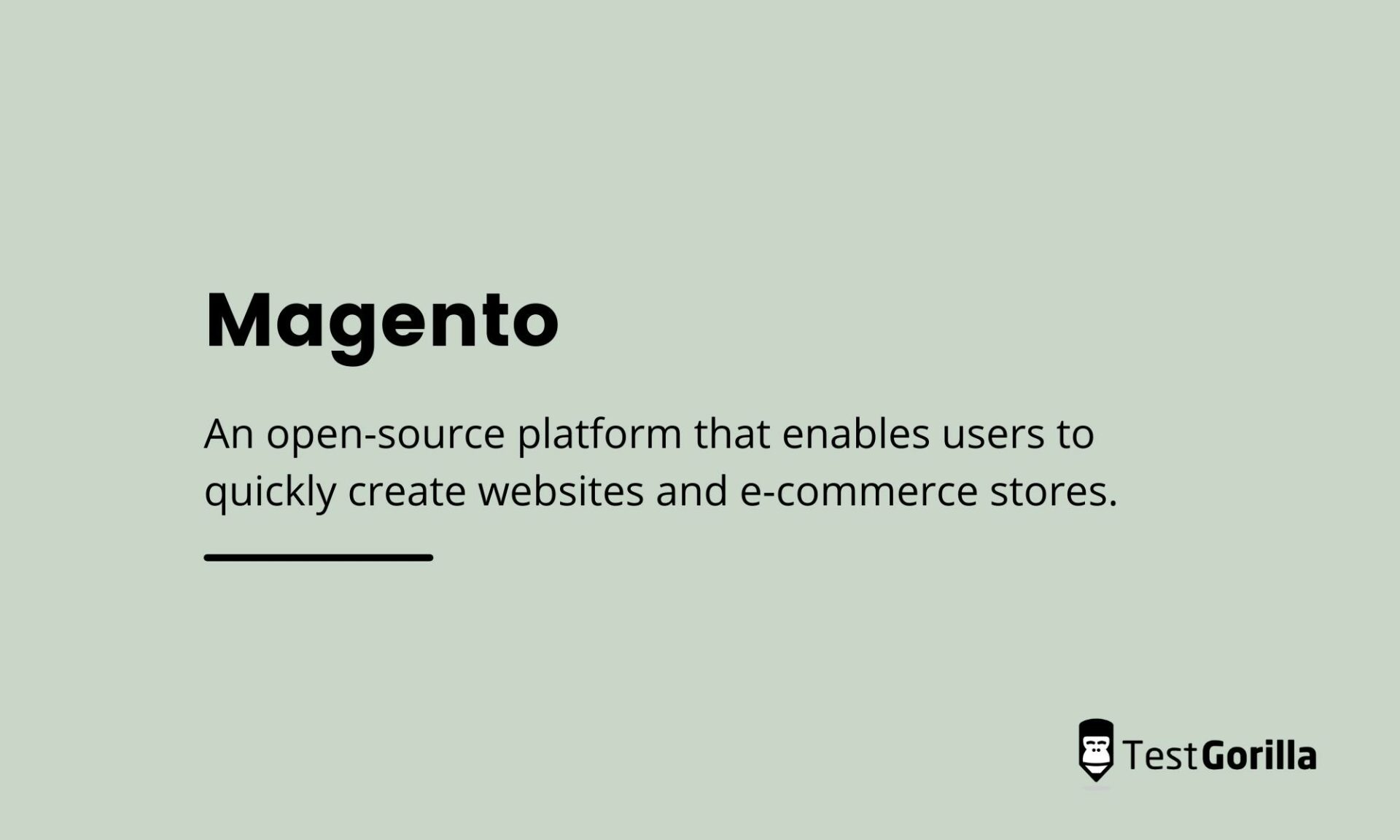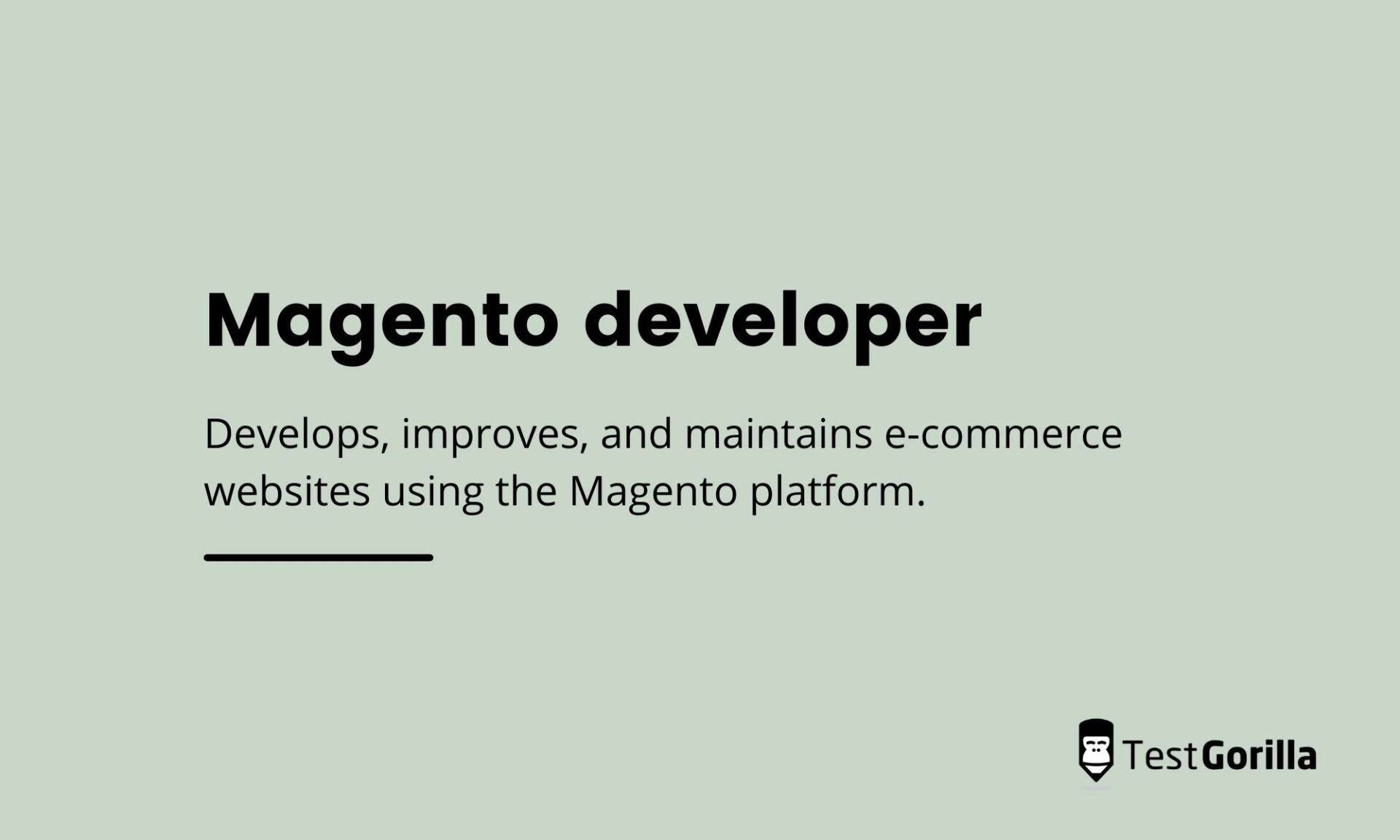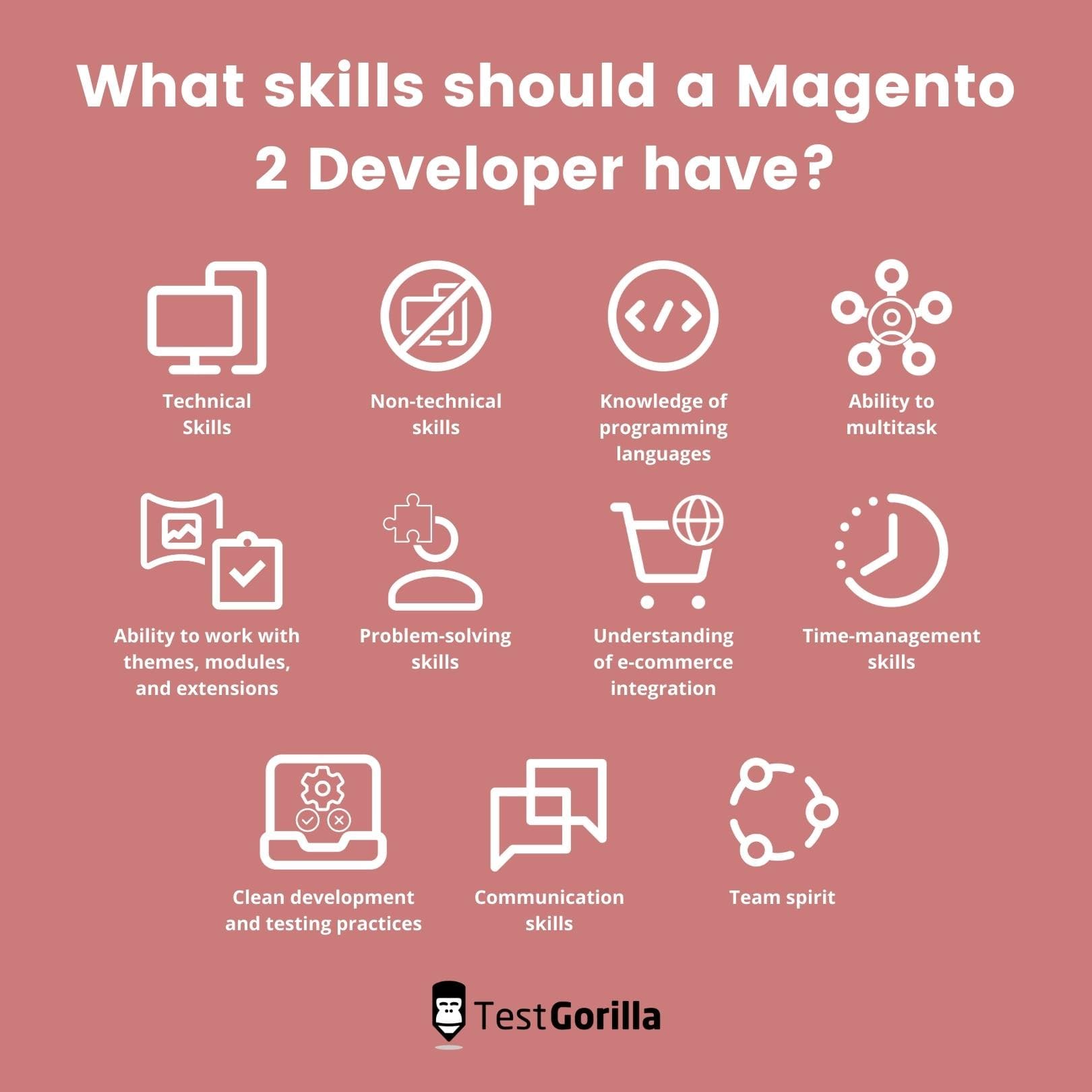With the increasing digitization of global industries, there’s a crucial need to solve problems quickly to adapt to our fast-paced world. Speed has become a vital element in every field, including web development.
Developers constantly search for tools and utilities to speed up, stabilize, and secure their websites. Services like Magento help meet these needs. Magento is a platform that enables users to quickly create websites and e-commerce stores.
It’s an open-source framework written and compiled in PHP. You can use it to develop and maintain e-commerce websites, but you’ll need highly skilled Magento 2 developers to make the most of the platform.
In this article, we’ll discuss Magento 2 developers, their responsibilities, and the key skills they require.
We’ll then explore tips to recruit the best Magento 2 developers, including the skills to include in your Magento developer job description and how to use TestGorilla’s Magento 2 test to improve your hiring process.
Who is a Magento 2 developer?
A Magento developer is an expert who develops, improves, and maintains e-commerce websites using the Magento platform. They are responsible for building flexible shopping cart systems and maintaining full control of sites’ appearance and functionality.
The Magento 2 platform has many useful tools that these developers harness to improve marketing, SEO best practices, and catalog management.
What does a Magento 2 developer do?
Below are more specific tasks that Magento 2 developers handle in their work:
Install and configure Magento Commerce
Join meetings with the design team
Develop Magento 2 themes according to agreed designs
Set performance objectives and metrics
Develop and install custom Magento 2 extensions
Code templates
Upgrade and migrate the framework
Test websites’ performance
Troubleshoot interface problems
Update security patches
Provide maintenance and support for websites
The best insights on HR and recruitment, delivered to your inbox.
Biweekly updates. No spam. Unsubscribe any time.
What skills should a top Magento 2 developer have?
Although the Magento platform has sufficient tools for building successful websites, only a skilled developer can make proper use of them for your business. Below are the technical and non-technical abilities that should be in the skill set of any top Magento 2 developer.
Technical skills
A top-level Magento 2 developer requires expert knowledge of the technical practices of Magento and related technologies. The ability to create websites isn’t enough to categorize one as a top developer. Pros also need the following technical expertise.
1. Knowledge of programming languages
Magento 2 is written in PHP, but other programming languages can aid website development. In addition to an understanding of PHP fundamentals, a skilled Magento 2 developer should have operational knowledge of CSS and JavaScript.
They must understand HTML, CSS preprocessors, SEO, and how to build responsive websites. It’s also helpful for them to have proficiency in modular development, model-view-controller architecture, MySQL for data interaction, and XML.
2. The ability to work with themes, modules, and extensions
Top Magento 2 developers combine the functionalities of several platforms to create great websites. They should have a basic knowledge of various themes, modules, and extensions, as well as how to use them to enhance a website.
3. An understanding of e-commerce integration
Top Magento developers understand the channel between companies’ e-commerce sites and their inventory. E-commerce sites automate workflows, eradicate data redundancy, and save time.
4. Clean development and testing practices
It’s typical for multiple developers and other professionals to collaborate on a website, so it’s essential to maintain the system’s integrity. Expert Magento 2 developers can resolve this issue by following clean development practices.
They must also know how to test the system extensively to develop websites that run smoother and have fewer bugs.
Non-technical skills
Besides their technical skills, what separates mid-level Magento developers from the most proficient ones is their soft skills. The best developers have excellent soft skills that enable them to solve problems and positively impact your organization.
Here are some non-technical skills developers should have:
1. The ability to multitask
The best developers don’t focus on one programming language but continuously expand their skill set by learning many languages and frameworks. It’s also important for them to know how to handle different tools simultaneously to solve website issues.
2. Problem-solving skills
Identifying, interpreting, and solving problems is an important skill required of every developer. For instance, they should understand how to handle data-related issues with database management systems like MySQL.
3. Time-management skills
Web developers often face tight schedules at work. They must learn to manage their time appropriately by prioritizing tasks so that they can complete their work by the deadline.
4. Communication skills
Magento 2 developers must understand clients’ needs and convey information properly. They require excellent oral and written communication skills to discuss technical and non-technical updates with colleagues and clients.
5. Team spirit
Though some developers are solo operators, many others work in a team. If you want to hire a Magento 2 developer to join your company, choose someone who is able to work with others to achieve your organization’s objectives.
3 tips for recruiting the best Magento developer
Now that we’ve covered the skills that a top Magento 2 developer should have, here are some tips for assessing these abilities and securing the best employee for your business:
1. Inquire about past projects
When interviewing candidates, it’s important to ask them about past projects that they worked on using Magento 2.
You can also personally look into their projects, either by viewing their online portfolios or speaking with their past employers. This will help you better understand their skill set, work style, and experience when it comes to using Magento 2.
If their portfolio of Magento 2 projects is small, you can still ask them about their experience. This will enable you to gauge whether they have a growth mindset and how enthusiastic they will be when faced with new challenges and milestones that require skill expansion.
For instance, you can ask them technical HTML5 interview questions if they have previously worked on a website’s HTML.
2. Use skills assessments
Many recruiters rely solely on resumes, interviews, and references to hire candidates. However, these traditional methods aren’t enough to fully determine whether candidates have the necessary skills and expertise, especially in web development.
It’s common for candidates to exaggerate their skills in their CVs or make false claims about their expertise during interviews. They can also give you unreliable references from friends, relatives, and associates, who will vouch for their ability to complete projects they have little to no experience in.
On the other hand, candidates could possess more skills and experience than they documented in their CVs. They could forget to update their resumes with certifications and skills they recently obtained, or their resumes might simply not do justice to their skills.
To avoid overestimating or underestimating candidates during recruitment, you should incorporate a prescreening test in your hiring process to shortlist the best candidates for the interview stage. In addition to evaluating their Magento 2 skills, you can also examine other abilities that are critical for developers.
Use skills tests to evaluate developers’ skills in several programming languages, like JavaScript, Node.js, CSS, and HTML. They’re also a great tool for determining if a candidate is better suited to be a front-end or back-end developer.
It’s best to give applicants a credible prescreening test like TestGorilla’s Magento 2 test to analyze how well they can use Magento 2 and JavaScript to manage orders and deploy updates.
The test identifies candidates who can customize Magento 2 for extension development, theme development, database changes, and third-party system integrations. Candidates who do well on the test have the skills to meet your organization’s e-commerce needs.
You should also use non-technical skills tests to assess developers’ soft skills. For instance, you can give your candidates a Culture Add test to find out whether their values and behavioral traits match your company’s culture.
3. Offer paid trial projects
Our final tip for recruiting the best Magento 2 developers for your business is to offer paid trial projects to high-potential candidates before considering them for the role. These projects should simulate the tasks the developers would handle as employees of your company.
Trial projects enable you to closely examine developers’ skills and work styles by assessing their deliverables and how they incorporate feedback. They are a reliable method for determining which candidates would make the best addition to the development team and your entire organization.
In addition, trials give candidates an opportunity to decide if the work environment and company culture suit their long-term career prospects.
Evaluate Magento 2 developers reliably with pre-employment testing
Traditional hiring methods no longer suffice if you want to assess candidates reliably and objectively. You might mis-hire a candidate based on false references and exaggerated abilities or pass on a highly qualified applicant just because they have an incomplete resume.
As such, it’s more important now than ever to include prescreening tests like our Magento 2 test in your recruitment process. Sign up with TestGorilla to make the right hires every time.
You've scrolled this far
Why not try TestGorilla for free, and see what happens when you put skills first.



















